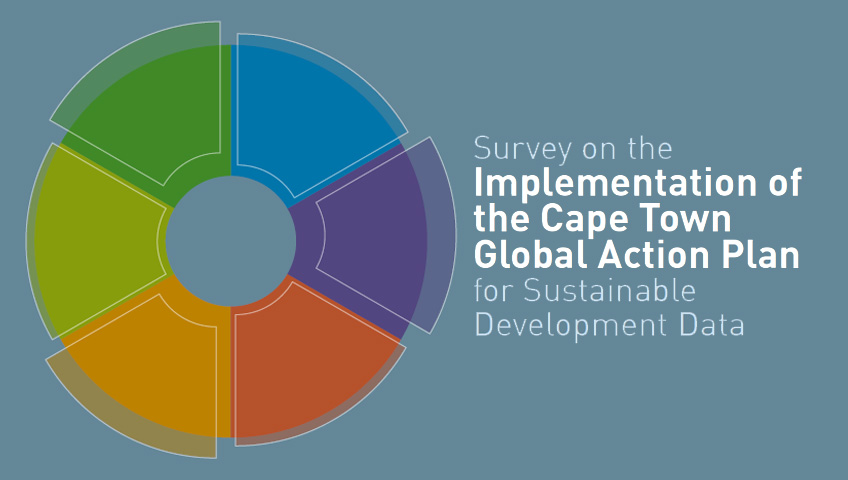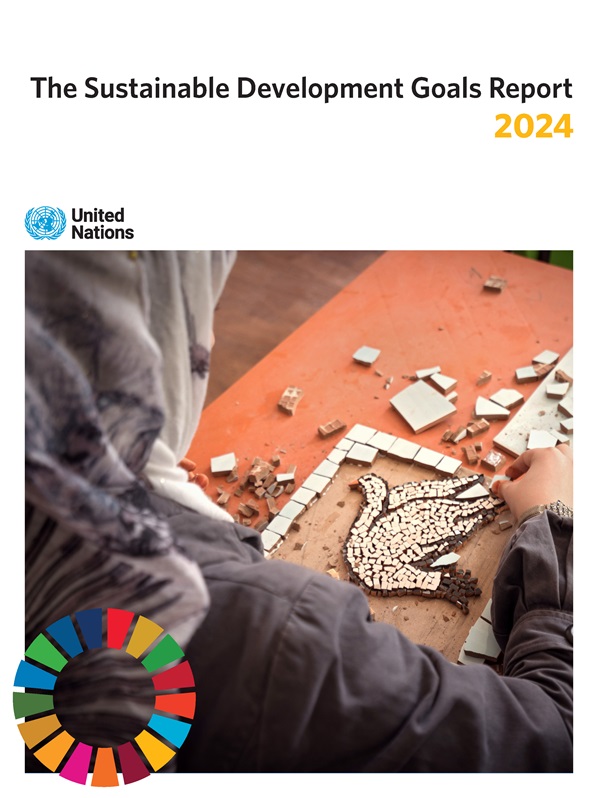News
This workshop is intended for government officials engaged in coordinating and preparing voluntary national reviews (VNRs) in countries conducting review at the July 2025 High-Level Political Forum on sustainable development (HLPF). The workshop will facilitate practical exchange of experiences and knowledge among countries, as well as explore specific issues and challenges related to the VNR preparations.
The fifteenth meeting of the Inter-agency and Expert Group on Sustainable Development Goal Indicators (IAEG-SDGs) will be held in person from 21 to 23 October 2024 in Oslo, Norway. It will be co-hosted by the UNDP Global Policy Centre for Governance (GPCG) and Statistics Norway.
The Sustainable Development Goals Report 2024 details the significant challenges the world is facing in making substantial strides towards achieving the SDGs based on the latest data and estimates. It features areas with setbacks while also showcasing where tangible progress has been made, for instance, in reducing global child mortality, preventing HIV infection, and access to energy and mobile broadband. The report also hhlights where action must accelerate, particularly in critical areas undermining SDG progress - climate change, peace and security, inequalities among and between countries, among others.
According to the report, with just six years remaining, current progress falls far short of what is required to meet the SDGs. Without massive investment and scaled up action, the achievement of the SDGs - the blueprint for a more resilient and prosperous world and the roadmap out of current global crises - will remain elusive. The lingering impacts of the COVID-19 pandemic, escalating conflicts, geopolitical tensions and growing climate chaos have severely hindered progress. The report details the urgent priorities and areas needed for stronger and more effective action to ensure the 2030 promise to end poverty, protect the planet and leave no one behind.
The fourteenth meeting of the Inter-agency and Expert Group on Sustainable Development Goal Indicators (IAEG-SDGs) will be held in person from 23 to 25 October 2023 at the CPH Conference-DGI Byen in Copenhagen, Denmark.
Launch of the UN Data Commons for SDGs

On Monday, 18 September 2023, during the SDG Summit, the UN Statistics Division, partnering with Google.org launched UN Data Commons for the SDGs. This new platform integrates authoritative SDG data and insights from across the UN System into a public repository with advanced search functionality and an innovative, user-friendly interface. Its aim is to put high-quality dataset s and digital public goods at users' fingertips, allowing for seamless exploration of diverse statistical datasets, the annual global SDG report, and analytics, to ultimately facilitate informed data-driven decisions.
The platform, built by the Statistics Division of the UN Department of Economic Affairs, in collaboration with Google's Data Commons, harnesses open, high-quality data from across the UN System, as well as cutting-edge technologies like Artificial Intelligence/Machine Learning (AI/ML), to make key SDG data and insights available to a diverse global audience, including policymakers, journalists, academics, and the public.
Key features include:
- Easily explore and download SDG data by country, region and Goal
- Advanced search functionality for SDG data insights
- SDG data and data stories together in one place
- Tools to explore and visualize SDG data
- Official SDG data available in Google's Data Commons for further exploration
UN Data Commons for the SDGs is part of the UN Data modernization initiative, which aims to provide a single entry-point for official data and statistics from across the UN System. Over time, the UN Data Commons platform will integrate an increasing number of authoritative datasets from across the UN System and release powerful tools for accessing and interacting with data in an intuitive, easy-to-use way. The UN Data Commons is spearheaded by the UN, with initial funding from Google.org.
Link to webpage: https://unstats.un.org/UNSDWebsite/undatacommons/sdgs
Check out the latest blog on our collaboration with Google here
The Sustainable Development Goals Report 2023: Special Edition provides a powerful call to action, presenting a candid assessment of the SDGs based on the latest data and estimates. While highlighting the existing gaps and urging the world to redouble its efforts, the report also emphasizes the immense potential for success through strong political will and the utilization of available technologies, resources, and knowledge. Together, the global community can reignite progress towards achieving the SDGs and create a brighter future for all.
According to the report, the impacts of the climate crisis, the war in Ukraine, a weak global economy, and the lingering effects of the COVID-19 pandemic have revealed weaknesses and hindered progress towards the Goals. The report further warns that while lack of progress is universal, it is the world’s poorest and most vulnerable who are experiencing the worst effects of these unprecedented global challenges. It also points out areas that need urgent action to rescue the SDGs and deliver meaningful progress for people and the planet by 2030.
The Global SDG Indicators Database containing global, regional and country data and metadata on the official SDG indicators has been updated and accompanies this report.
The thirteenth meeting of the Inter-agency and Expert Group on Sustainable Development Goal Indicators (IAEG-SDGs) was held in person from 7 to 9 November 2022 at the UN Conference Centre (UNCC) in Bangkok, Thailand. This was the first in-person meeting of the IAEG-SDGs since October 2019 in Addis Ababa.

On 23 September 2021, the new Global SDG Indicators Data Platform was launched. The platform includes four components: a new, user-friendly interface to the Global Sustainable Development Goal Indicators Database, access to the SDG Country Profiles, the entirely new SDG Analytics and Advanced Access options.
On 07 March 2022, important updates (and some fixes) to the Global SDG Indicators Data Platform have been deployed in a second release. These include the ability of users to save and share their queries, improved query navigation and data download in SDG Analytics, and dramatically improved access to SDG indicators metadata in machine-readable format via an SDMX API. The SDG Analytics now also includes the ability to review the availability of disaggregated data at the most elementary level. One important 'fix' provides greater clarity in the query selection of countries and areas in the Global SDG Indicators Database. These updates are based on the feedback of users. Please share any Questions and Feedback.

The report of a Survey on the Implementation of the Cape Town Global Action Plan for Sustainable Development Data was published on 3 February 2022, presenting the responses of over 100 National Statistical Offices from all regions. The survey, which was conducted in partnership between the Statistics Division of the Department of Economic and Social Affairs, the World Bank, and PARIS21, will inform further actions by decision makers and international partners to implement, monitor, and finance the CTGAP. Since its launch in January 2017 at the first UN World Data Forum in South Africa, and its formal adoption by the United Nations Statistical Commission at its forty-eighth session in March 2017, the Cape Town Global Action Plan for Sustainable Development Data (CTGAP) has provided a framework for planning and implementing the statistical capacity building activities needed to achieve the scope and intent of the 2030 Agenda for Sustainable Development, and to mobilize funding for the modernization of national statistical systems across the world.
On 23 September 2021, the new Global SDG Indicators Data Platform has been launched. The platform includes a new and user-friendly interface to the Global Sustainable Development Goal Indicators Database where SDG indicator data can be easily searched and downloaded (as table and in bulk).
The platform also provides access to the SDG Country Profiles where - with a single click - trends for individual countries across the SDG goals are being shown.
The entirely new SDG Analytics allows the interactive analysis of data availability, to review global and regional trends for individual indicators (data series) and to compare trends for countries and areas and for different indicators (data series).
In addition, the new Global SDG Indicators Data Platform includes a menu of Advanced Access options and convenient links to authoritative SDG indicator information and important additional resources.
The Sustainable Development Goals Report 2021 reviews progress of the 2030 Agenda for Sustainable Development, using the latest available data and estimates to track global progress of the 17 Goals with in-depth analysis of selected indicators for each Goal. The report highlights the devastating impacts of COVID-19 on the SDGs and points out areas that require urgent and coordinated action. The report is prepared by UN DESA in collaboration with more than 50 international and regional organizations.
The Global SDG Indicators Database containing global, regional and country data and metadata on the official SDG indicators has been updated and accompanies this report. The Sustainable Development Goals Progress Chart 2021, a snapshot of global and regional progress, also accompanies this report.
QUICK LINKS
- 2030 Agenda for Sustainable Development
- SDGs Database
- 2025 Comprehensive Review Process
- Survey on the Implementation of the Cape Town Global Action Plan for Sustainable Development
Data

- SG's progress report 2024
- Statistical Annex 2024
- SDGs report 2024

- Gender Snapshot 2024
- UN Data Commons for the SDGs
-

- Medellin Framework for action on data for sustainable development
- Hangzhou Declaration
- Bern Data Compact
- Cape Town Global Action Plan for Sustainable Development Data
- Dubai Declaration
- Global data community's response to Covid-19
- Statistical Commission